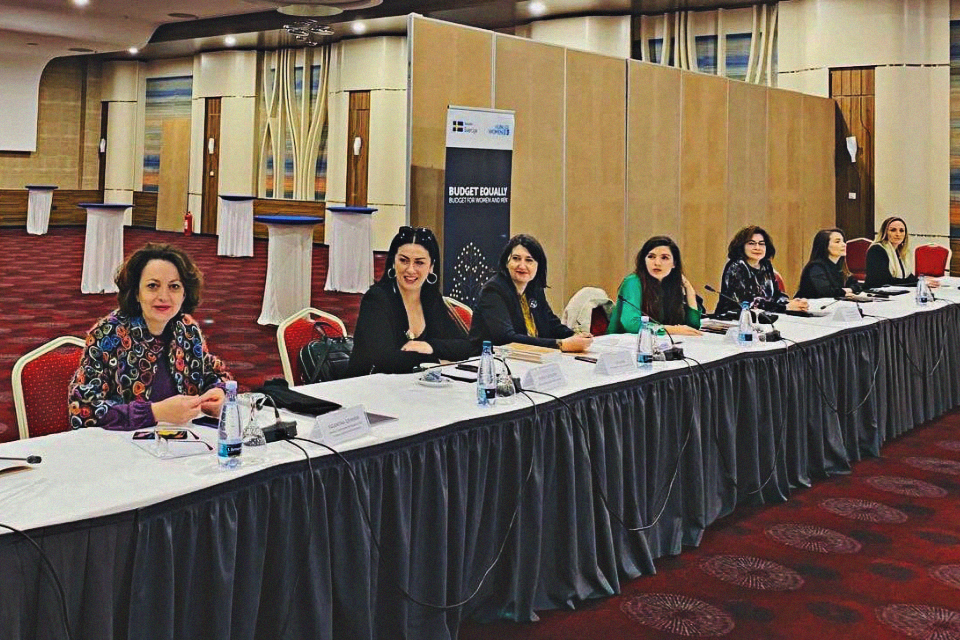In Kosovo, parliamentarians share strategies to boost gender-responsive budgeting
Date:
To ensure that governments allocate spending to meet the needs of both women and men – also known as gender-responsive budgeting (GRB) – 15 high-level representatives gathered for a two-day workshop supported by UN Women in Kosovo[1] in October, 2021.

Highlighting the role of Kosovo’s Parliament and Ministry of Finance as key entry points for the budget cycle, the workshop was co-organized by Kosovo’s Women Caucus in collaboration with Kosovo’s Agency for Gender Equality.
“Some issues might look equal at first sight, regardless of gender, but when looking through a closer lens, we see that they do not impact women’s lives at all. No one is against building a football field, but we know that it is difficult for a girl to step in there,” says Tinka Kurti, Chair of the Women Caucus, noting that budget planning must take gender issues squarely into consideration.
Providing a forum for discussion and recommendations on the future of GRB, workshop participants included: women Members of Parliament, members of the Committee on Human Rights, Gender Equality, Victims of Sexual Violence During the War, Missing Persons and Petitions as well as members of the Commission on Budget, Labour and Transfers, and the Agency for Gender Equality.
The workshop also served to exchange best practices in the region, with examples from the Albanian Parliament on the implementation of the GRB.
As a special guest from Albania, Eglantina Gjermeni, Member of the Parliament and Chair of the Parliamentary Commission for Legal Affairs noted that the legislature has an important role to play in supporting gender budgeting initiatives proposed by the Government, but also in new initiatives that can be undertaken by parliamentarians to reduce gender inequalities and monitor the budget from a gender perspective. Further, she highlighted the importance of analysing and monitoring financial resources and how they are spent to meet the needs of both, women and men.
Meanwhile, Vlora Tuzi Nushi, Head of the UN Women Office in Kosovo emphasized the key role that UN Women’s regional programme on transformational financing for gender equality in the Western Balkans is playing in enhancing the inclusion of GRB analyses in budget planning.
“UN Women, under this new four-year regional programme that is financially supported by the Swedish Development Agency (SIDA), will continue to guide efforts to increase funding for gender equality through strategic partnerships, providing tailored technical assistance and guidance, and building institutional capacity and knowledge,” said Tuzi Nushi.
The gender-responsive budgeting policy in Kosovo, legal frameworks, budget cycles, and policy planning and execution systems, were among the topics discussed, as well as the role of Kosovo’s Assembly in executing the budget cycle and as a key entry point for facilitating the implementation of gender-responsive budgeting.
“Gender-responsive budgeting is neither a monetary allocation to fulfil some women’s rights, nor a decorative policy or political instrument,” explains Blerinda Idrizi, an International Expert on Gender and Public Policy engaged by UN Women. “During the implementation of GRB, all stakeholders should maintain its radical content as a transformative strategy that seeks to undo societal and institutional asymmetric power relations between men and women.”
The workshop concluded with a fruitful discussion among parliamentarians on the challenges to gender-responsive budgeting in Kosovo, further steps that need to be taken for its optimal implementation, as well as the role of Kosovo’s Assembly in addressing the specific needs of women and men in Kosovo.
[1] All references to Kosovo should be understood to be in the context of United Nations Security Council resolution 1244 (1999).